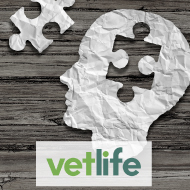
Guidance from veterinary mental health charity, Vetlife
In light of the government's advice on social distancing, mental health charity Vetlife has put together comprehensive guidance concerning the impact on mental health for the veterinary profession during the COVID-19 coronavirus outbreak.
Here we have pulled out some of the charity's key information and advice. For the full document, and advice for those already struggling with their mental health, please click here.
Information overload
While it is important to stay up-to-date with the evolving situation, Vetlife recommends that people only look for information updates at specific times of the day. Watching, listening or reading news once or twice a day from a trusted source will limit how much information you are exposed to and can prevent feelings of anxiety and distress.
An individual's control of the current situation is very limited, and therefore overexposure to news can only increase worry and may even enable the spread of misinformation.
Maintaining connections
Self-isolation, social distancing and quarantine rules mean that we may now have very limited contact with our friends and family during this time. However, being able to still contact our loved ones during this pandemic is crucial for our mental well-being.
Vetlife suggests trying to maintain and structure in regular social contact using social media, video calls or telephone. Indeed, many families are now hosting virtual birthday parties or online pub quizzes!
While self-isolation can make you feel withdrawn and less likely to want to reach out to others, you must do so, even if it does feel very difficult.
A sense of routine
If you've suddenly found yourself working from home, you might be feeling a little lost - especially if you are now also looking after children or vulnerable people who may also be self-isolating.
Keeping to usual timings can help you to cope with this sudden change and maintain a sense of normality. For example, going to bed and getting up at the usual time and eating when you would normally do so.
Increasing the amount of contact you have with friends and family by phone or telephone can also be a massive help during this difficult time.
Look after yourself
Sleep and rest are vital for our mental health and, under this increasing pressure, they are more important than ever.
As caring professionals, you might naturally turn to look after others before you care for yourself. But you must take some time out for yourself to rest, sleep, eat regular meals and stay hydrated.
Vetlife recommends prioritising rest days and breaks where you can. More advice about sleep can be found at https://ep.bmj.com/content/102/3/127
What can you control?
Vetlife states that you should identify aspects of your life and work which you can control and maintain these. During times of adversity, having a sense of control is important, even if it is only over very small things.
For more help and advice, the Vetlife Helpline is available 24 hours a day, seven days a week for confidential support. To contact Vetlife, please call 0303 040 2551 or click here to send an anonymous email.



 RCVS Knowledge has welcomed Professor Peter Cockcroft as editor-in-chief for Veterinary Evidence.
RCVS Knowledge has welcomed Professor Peter Cockcroft as editor-in-chief for Veterinary Evidence.